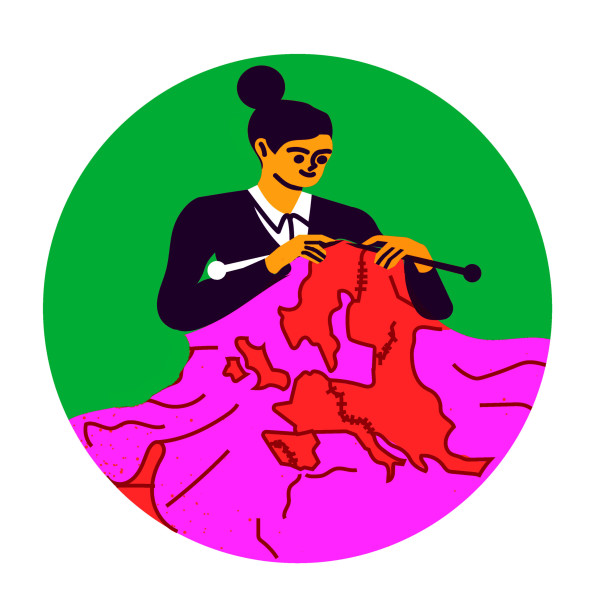To do: 6 thorny issues lurking in MEPs’ inboxes
This article is part of the Brussels Survival Guide.
Becoming a member of European Parliament isn’t just about fancy gifts and bottomless (well, €4,950 a month) general expenses. There’s also serious work to be done.
But a new term doesn’t mean a blank slate. Lawmakers in the 10th European Parliament will need to finish up files left undone by the previous crowd, and also deal with some pretty big issues that are already shaping the agenda for the months — and even years — ahead.
Here’s a selection of what’s on the to-do list.

Protecting kids online
The European Union is likely to come under pressure to better protect kids and teenagers online as fears around screen addiction, cyberbullying and lurking offenders grow.
Following adoption by the last crop of lawmakers of the EU’s Digital Services Act, which forces the likes of Instagram and TikTok to ramp up their measures to protect minors, incoming MEPs will scrutinize how the European Commission is actually enforcing the law. They may also face pressure for new and stronger measures, especially as the Commission is weighing a reform of digital consumer protection rules touching on manipulative and addictive designs and influencers.
The new batch of parliamentarians will also have to pick up unfinished negotiations on a hot-button regulation that could force messaging apps to scan messages to report images of children suffering sexual abuse and conversations between potential offenders looking to lure kids. While negotiations stalled over concerns around privacy, the measures are seen by children’s groups and police forces as necessary to fight growing crime.
— Clothilde Goujard

Competitiveness, competitiveness, competitiveness
New lawmakers should be aware that they’re entering not only the Brussels bubble, but also the “how-the-EU-can-regain-competitiveness” bubble. It was the buzzword on everyone’s lips in the dying days of the last Parliament, and it’s unlikely to go away anytime soon.
There are several key texts on offer for MEPs who want to bone up: the high-level report on the future of the single market by former Italian Prime Minister Enrico Letta, the EU strategic agenda for the next five years, and former ECB chief Mario Draghi’s high-level report on EU competitiveness.
The overall priority to make Europe competitive again is to “deepen the single market,” which means slashing more than 100 regulatory barriers that impede businesses and professionals from moving from one country to another.
Other ideas include a new code of law for small businesses or new public procurement rules to help European industry. The most complicated issue is getting EU countries to comply with the single market rules. Good luck with that.
— Giovanna Faggionato

CAP comin’ atcha — anew
Returning MEPs will have a sense of déjà vu; newcomers will have to quickly learn the ins and outs of one of the EU’s oldest and most complex policies. That’s because it’s once again time to talk about the Common Agricultural Policy, the EU’s gargantuan farm subsidy scheme, which is replenished with more than €300 billion every seven years.
The current funding period only started last year (its implementation was delayed by two years due to protracted negotiations) — but EU institutions, and MEPs, have already begun to open the Pandora’s box in the wake of farmers’ protests, voting through a series of amendments to remove or relax agricultural obligations to protect the environment, and cut red tape. While changes relate to the current CAP, negotiations on the post-2027 version are expected to begin soon.
Lawmakers will have to decide which way to go — a carrot or a stick approach to greening the agri-food sector so that it doesn’t continue to choke the planet with greenhouse gas emissions.
“Farmers may have moved from the streets to the fields, but that doesn’t mean the crisis is over,” said a senior EU diplomat, granted anonymity because they were not authorized to speak on record, referring to the climate in which the negotiations are taking place.
— Bartosz Brzeziński

Picking up the pharma package
Why do some EU countries get new drugs years later than others? That’s the question underlying the first major overhaul of the bloc’s medicines regulations in 20 years, which aims to make access to medicines more secure and affordable, encourage innovation and reduce red tape. Parliament already has something of a head start on this complex file, having agreed its (rather pharma-friendly) position just before the term ended.
But Pernille Weiss, the European People’s Party lawmaker who jointly shepherded the file (and helped make the Commission’s proposal more palatable to industry) has stood down, leaving the shape of negotiations with the Council unknown. Unsurprisingly, given the unequal situation across the EU, different countries had different views on whether to prioritize innovation or access to medicines. Negotiations against the backdrop of drug shortages and an EU push to entice manufacturers back to the Continent make this a politically delicate balance.
— Mari Eccles

A European money market
This one’s a head-scratcher. The EU wants to forge a single market for investment to fund political goals like the green and digital transitions — or a “capital markets union” in Brussels jargon. French President Emmanuel Macron thinks the EU needs a one-year deadline to finish it. The problem is, the EU has been trying for a decade already, and legislating it into existence has never worked. The political project has now hit the desks of the bloc’s national leaders, who will fight over which reforms are needed.
The biggest ideas that could keep European parliamentarians busy in the next term? Reforming supervision of the EU’s markets; breathing life into its dormant market for resold loans; attempting to harmonize some national bankruptcy and tax laws across the EU; and potentially ushering through changes to how banks prepare cash buffers in case of risk. But one factor MEPs won’t be able to control is whether citizens and businesses buy into the project, investing in the EU rather than parking their money in bank accounts or investing it abroad.
— Kathryn Carlson

How to pay for everything
Let’s finish with a big one: Money. Few things in Brussels are as fiercely political as budget negotiations. Capitals must agree by the end of 2027 on the bloc’s seven-year fund that determines how much money is spent, on everything from funding poorer regions to handing subsidies to farmers. And it’s Parliament’s job to sign off on all of it.
Budget talks are usually very fraught — and this time they are set to be even more difficult. EU leaders will haggle over cash as war is raging on their doorstep — and they will also have to find new money to pay back interest rates for post-pandemic common debt, while preparing the ground for the biggest wave of the bloc’s enlargement in 20 years.
It will come to no one’s surprise that the EU’s powerful capitals are deeply divided over where to find all that cash, not to mention what they see as their priority for the next years. To make things even more difficult, expect tensions between Council — where most leaders hail from the center or center-right — and Parliament, where the left-leaning Socialists and Democrats are expected to be the second-largest group.
— Gregorio Sorgi